For this edition, and in-keeping with the theme of time within the concepts of hedonism and leisure, it seemed pertinent to speak to someone who has a very distinct view on time – which might perhaps be expected of a person whose family history can be traced throughout the centuries, through eras of joy and wrath; a family of princes and kings. Estimable, emanating friendliness and in commendable Portuguese, Charles-Philippe d’Orléans tells us how he hates feeling that time can slip through his fingers, and is passion about fine watchmaking. We learn, among other things, that for this petit-fils of France, an ardent European and citizen of the world, time has never been as democratic as it is today.
—
You enjoy a close relationship with the world of watchmaking but a few years ago you were very closely involved with the Jaeger-LeCoultre (JLC) brand. Can you tell us about this venture?
It’s a very funny story. From being young I have always been involved in charitable actions, and this one time I went with my wife to Africa, namely Ethiopia and Somalia, as part of a United Nations Programme. I went to help on a project that aimed to create access to drinking water for more than 50,000 refugees. It was a huge project and everything was a big adventure, in which we actually nearly died. It was all very complicated, very difficult, and the day after our return to Portugal, there was a lavish gala dinner at the Monastery of Jerónimos – tuxedos and everything – provided by JLC following the restoration of the clock of the Augusta Street Arch. Myself and my wife, who had been invited, did not want to go, because, having seen the drama of the refugee camps, people living in the greatest misery imaginable, and still being fresh in our memories, we were not in the right mindset to attend a formal dinner like that, which at that moment and in that context, seemed superficial. The person who organised the event, however, was a friend, and insisted that we went – so we ended up going and I met a man there named Jerôme Lambert, who at the time was the CEO of JLC, and who is now CEO of the Richemont Group. Besides being a great businessman, he is a very humane man with strong values and sensitivity. He sees beyond the Excel spreadsheets. At dinner, Diana was sitting next to him and I was in front of him. Naturally, all this was a cultural and social shock to us, and we ended up pouring our hearts out … We recounted what we had recently been through, and at the end of the dinner Jerome Lambert asked me how much such a project cost. I said. It is a lot of money, half a million euros, and he said right away «we’ll pay, JLC will finance this project. It completely reflects our values, it is fitting with JLC’s history and with what we want to convey. Moreover, it is linked to water, and water, in general, is an essential element in JLC’s charitable policy». It was very spontaneous, very fast, and in fact it was thanks to JLC that we managed to guarantee access to drinking water for 50,000 people – which is a lot of people. It was a beautiful story involving JLC and its entire team.
Do you remember the first time you ever took notice of a watch, or when you started paying more attention to the object rather than its functionality?
(Laughs) This might seem contradictory, but when I was young I loved Swatches. I had a huge collection of about 80 watches. I would save money to buy the next model. At the time, it was something different, modern, colorful… and that was my first serious involvement with watches, so to speak. Then, when I started working, I started buying a different type of watch, and today I have some very good watches. I have a Chopard Mille Miglia Classic Chronograph, an extraordinary Audemars Piguet Jules Audemars Cabinet No. 1 Tourbillon; a Jaeger-LeCoultre Reverso Classic Large Duoface; a Bamboo Crystalball Badollet. Anyway, it’s a small collection, but of great sentimental value, because each watch has a story. For example, the Audemars Piguet was a wedding gift from the King of Morocco, and it is an extraordinary symbol of my personal relationship with the royal family and the country – which goes beyond the historical relationship that exists between our families. The Chopard is also of great sentimental value because it was given to me by my wife for a wedding anniversary. Anyway, each has its own sentimental and symbolic significance, which is much more important than a price tag.
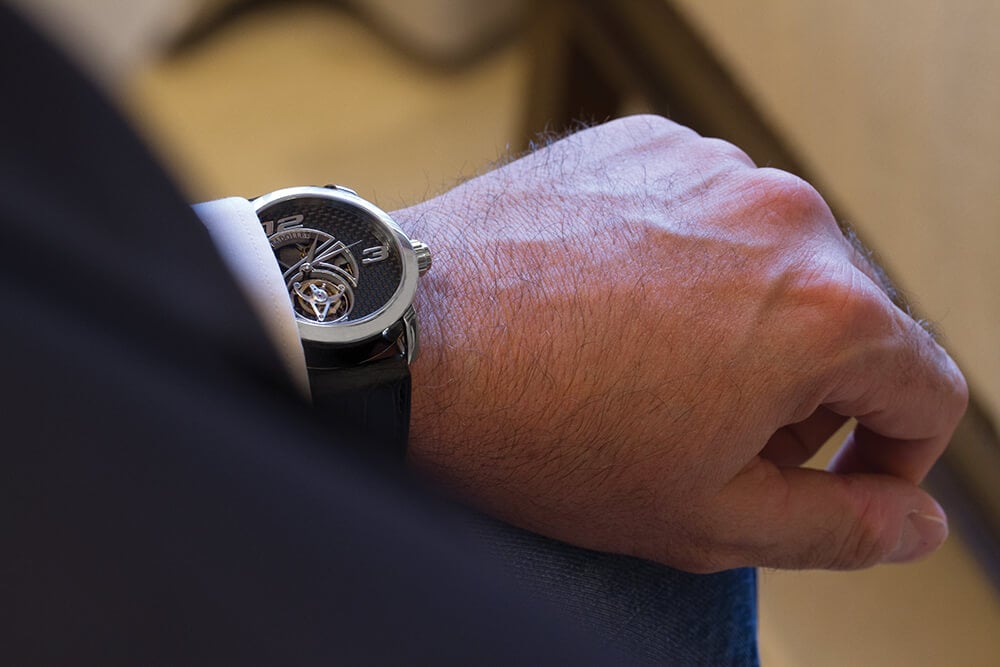
Right now on your wrist you’re wearing a brand that only real connoisseurs will know of. A very specific brand that specializes in tourbillons.
Yes, but first, I think I must recall that one of the most important patrons of clock-making, in general, was an ancestor of mine, King Louis XIV of France, who was fascinated by clocks – at that time, by table or wall clocks, with which he filled Versailles. Having said that, I do have a passion for Badollet, because I place great value on its exceptionality and its details, rather than on any commercial value. It is not a well-known brand among the general public. It is a brand for connoisseurs, born in Geneva in 1635, and it is one of the oldest brands out there – for me it invokes values, tradition. Very few people have these watches because it is a unique brand that produces only a few dozen pieces per year. It is very private, but they do something that I appreciate: they produce quality over quantity. Few pieces, but made with love. Few pieces, but made with values and passion. It is a manufacturer based in the heart of Geneva, made up of people who spend many hours on one single piece, who put in so much of their time and their lives to make and assemble the pieces that we wear on our wrists. This is the passing-on of values that I admire and value.
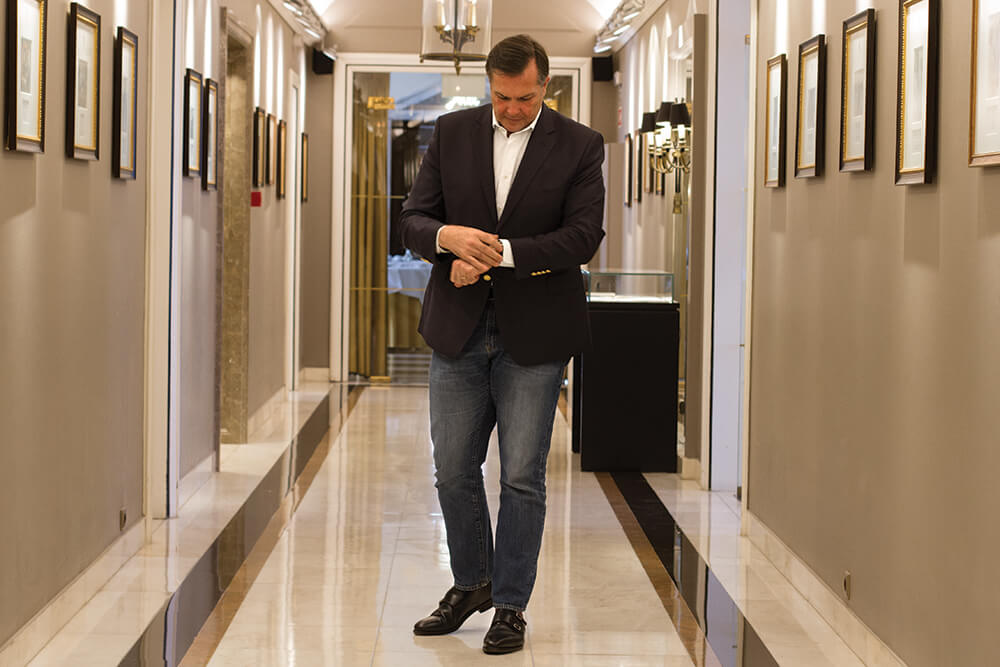
In a way, it is the time that watchmakers dedicate to the creation and assembly of the pieces that give them their value, as Saint-Exupéry would say.
Yes, but there it is again: it is not the commercial value that matters, but the value that comes from a piece’s exceptionality and its delicacy. There are models that comprise meteorite stones, really unique things. There is one called the Crystalball Bamboo, which is inspired by the personal tastes of one of the heirs of the brand’s founder, who is passionate about cars. The structure of the watch, visible through the bottom, is inspired by the engine boxes of the very first Maserati. Many people can buy a Rolex or a Patek Philippe, for example, but not everyone can buy a Badollet – because there are so few.
Isn’t that what luxury is all about, the rarity of things? Whether that is the rarity of an object, a moment, or an experience?
Luxury is closely associated with rarity, discretion, and elegance. These are exceptionally beautiful and detail-packed watches with modern designs, which is something I also love about the brand – a brand with so much history in making watches that are contemporary yet discreet. Let’s say that they don’t have glittering extravaganzas.
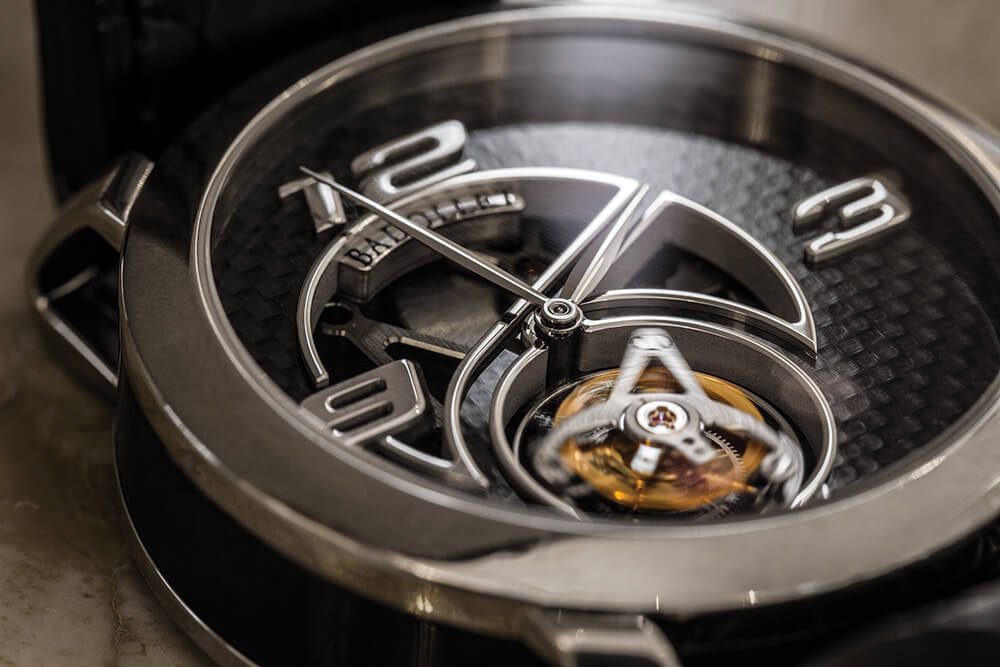
You are a very busy person, someone who travels a lot, and has a team to help you manage you time. How organized are you, and how does your time-management differ when you are in France, Spain, Portugal, or elsewhere?
I am extremely methodical. I have a 12-year career in the French army, where everything is timed and super-strict, which contrasts with my wife’s way of doing things – but I think that’s part of her charm (laughs). I like an extremely strict management of my day-to-day life. That’s why I like watches where the precision of the second hand is accurate. Effectively, when one travels a lot, one notices that different countries have different notions of time. Daily time management is not the same in Spain as it is in Sweden. There are determining factors, such as culture, tradition, history, climate, light, etc. I have an obsession with how time is spent: I do not like wasting time, I do not like feeling that it is slipping away, and therefore I want to enjoy every second, so that I do not feel the time passing and that it is spent in a positive way. Mine is an intense professional career with lots of trips and schedules; time management is essential to make the most of time and not waste it.
What is a typical week like for you?
I travel the most for the work I do for the Prince Albert II of Monaco environmentalist foundation. It takes me away once or twice a week: sometimes nearby; other times to the other side of the world. To Japan, for example, a country where they also have an interesting relationship with time. I try to manage my work harmoniously so that it does not have negative implications for the family. This is very important. Family first; I really enjoy spending time with my family.
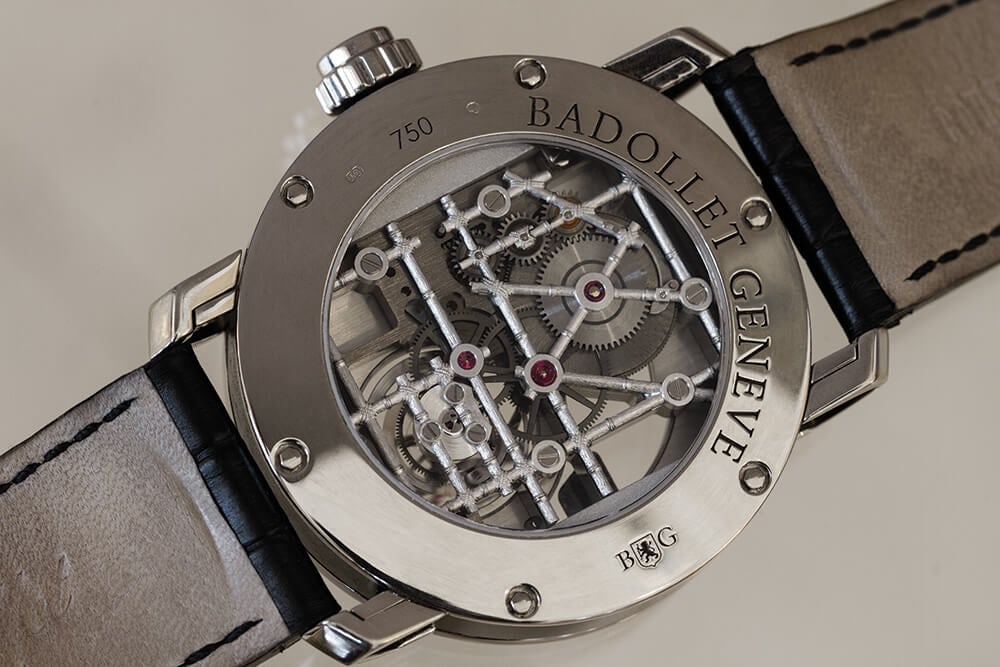
Where do you feel most comfortable with how time is spent? In Portugal, France, Spain …?
In Portugal. I’m not sure if it’s where it yields the most, but life is a lot less stressful, and I think I make the most of time, and life, in Portugal. I think the relationship of the Portuguese with time is different. The way different cultures and civilizations experience time is interesting. In Paris, you waste a lot of time in traffic or waiting around, and it’s very stressful. In Portugal, before, I would waste a lot of time waiting for meetings to start, because the Portuguese tend to be late. I think, however, that this is changing a bit. At least in relation to me (laughs).
You mentioned spending time in Japan. It seems it made an impression on you.
Yes; today there is a culture of everything being instantaneous, immediate; American culture, where everything has to be done quickly, business has to be fast, relationships have to be built quickly. In Japan it feels like you have all the time in the world. If something is not done today, it is done next week or next month. It can be stressful for American businessmen, but it keeps things very interesting. With the Japanese, meetings are long and business takes a long time to complete. They are an ancient civilization. The emperor, for example, abdicated after nearly 90 years. The gardens of Japan are inspiring, and there is a whole zenitude, that is, a Zen attitude. Time, for the Japanese, is not to simply spend, it is to be enjoyed. It’s like they never feel obliged, nor do they have the need to prove anything to anyone. Like the Chinese. They have their history, it is an ancient history, they are conscious of it, and they know that they have been around for a long time and that they will stay around for a long time.
Another place where one feels the dimension of time differently, very differently to Asia or in the West, is Africa.
Yes that’s true. I’m in love with Africa. There, time pretty much stops. (laughs) It goes maybe too slowly. There, it’s not just time or hours that stall, everything is subjective. It is extraordinary.
Is dolce vita a concept you endorse?
It means having time to enjoy time. It means doing nothing, knowing that everything is being taken care of. It’s fare niente, it’s elegance, it’s glamour, it’s being happy with yourself wherever you are. It is not just about being seen in the right places or what you see on postcards, because each person has their own notion of dolce vita.
To what extent has this notion varied over time among European aristocracy? The way the bearer of a centuries-old lineage sees time must be different from ours, but it must also differ to that of your ancestors, I presume…
Exactly. In one country, there were two different cultures with regard to time. Some had to survive and struggle to build a family, and others, those of the Court and high aristocracy, basically considered time a gift with which they toyed. This has changed a lot, for better or worse – depending on the points of view (laughs), – but the relationship with time in European royal families and common families is today the same, I think. Today, things have to get done, answers are expected and no answers can take six months to give. In any position in society, whether that of an employee, a manager or a king, we all have the requirement to be accountable and give answers – not later, now.
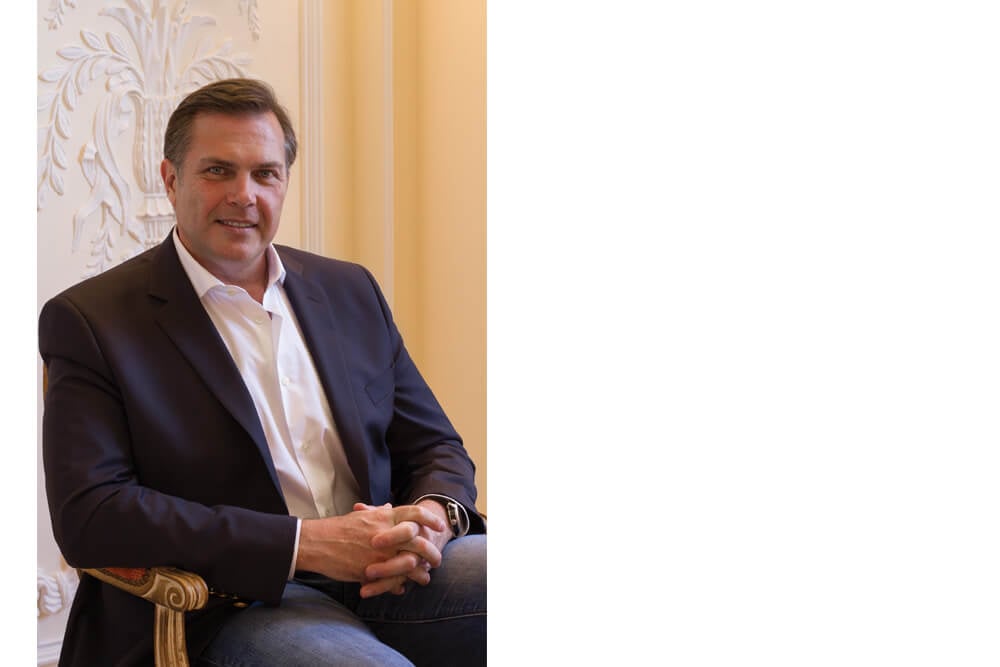
In your opinion, which of your ancestors best enjoyed their time?
Louis IX, St. Louis, King of France, who was canonised and did something extraordinary: he spent time sitting under a tree listening to everyone’s complaints; all of the town’s citizens, craftsmen, merchants, soldiers and nobility, and did justice under that tree. It is a form of relationship not only with time, but also with nature.
And the biggest reveller of your ancestors, would that be Louis XIV?
(Laughs) He was crazy. But I think that he had the same problem that I have with time, I do not like that it passes.
At what point in your life do you think you made the most of time?
(pauses) Maybe when I was in the French army, because of the camaraderie and the feeling of being useful. I have been in Africa, in Bosnia, in various conflicts, in which France has been involved, and it is hard to see the human suffering that war causes. I think that was when I took the most time to learn, to understand, to listen and to help.
And today? What do you most enjoy doing with your time?
Making the most of it. I have the good fortune to do a job that gives me great pleasure. I am one of those people who wake up in the morning smiling and joyful; I open the curtains, I see the sun and I think what great day lies ahead and that another great day will follow. That might be spending time with the family, working – for those who enjoy working – or going out to sea, which I have a great passion for. I could spend the whole day out at sea without ever feeling like time is wasting.
Is there anything you wish you had more time for, but you just don’t have it?
No, because I prioritise time for the things I love. I have no regrets, I can not say I would like to be able to spend more time with my wife, or daughter, or mother. No. I make sure I manage my time so I can spend time with everyone.
Espiral do Tempo thanks Carlos Piçarra and Hotel Palácio Estoril for the availability of the venue for this interview.
[Read also the full interview in the Summer 2019 issue of ‘Espiral do Tempo’ – PT only]
—










